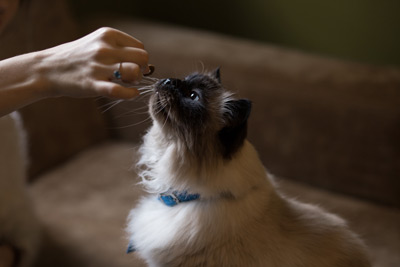
Cat Health & Wellness
Keeping your cat at a healthy weight is an investment in their long-term health, lowering the risks of arthritis, diabetes, certain cancers, and more.
So, how do you know if your cat is at a healthy weight? How do you maintain a healthy weight if your kitty is a couch potato?
Read on to learn more about this important cat health consideration…
Cats may look cute when they’re on the “plump” side. However, extra weight can lead to a variety of health issues.
Excessive weight is the most common and preventable health problem in cats today—with approximately 1 out of every 3 cats in the U.S. being considered obese!
So, why is this a concern?
Extra body fat puts a cat at increased risk for…
In particular, overweight cats are very prone to developing type 2 (insulin resistant) diabetes mellitus—a condition that can require lifelong insulin injections.
Plus, being overweight makes playtime and grooming more difficult for a cat.
For these reasons, keeping your cat at their ideal weight is important to their physical and mental wellbeing.

To provide an objective measurement for different individual cats, most veterinarians look at the Body Condition Score, or BCS.
The most commonly used scale ranks a cat from 1-9. On this scale, 1 is underweight, and 9 is obese. The ideal BCS is 4.5-5 (mid-range, or just slightly slim of mid-range).
Note: Sometimes a scale of 1-5 is used, where mid-range, or 3, is ideal.
Estimate your cat’s BCS using the diagram to the right:
This scale gives you a good idea of where your kitty is right now. You can even contact your veterinarian to determine your cat’s ideal body weight, and to create a safe and healthy weight loss plan if needed.
If you believe your cat is a bit overweight, here are some general tips to help with weight loss in cats:
Veterinary nutritionists recommend cats drop about 1% of their body weight per week; if your cat weighs 15 lbs. the experts would recommend a loss of about 2-3 ounces per week.
Keep in mind, restricting food intake too much can be dangerous for cats.
Hepatic lipidosis (fatty liver syndrome) is common in overweight cats who stop eating suddenly. It occurs when stored body fat is broken down too rapidly—which burdens and damages the liver.
Although hepatic lipidosis is reversible, it requires prompt and aggressive treatment, and can be fatal.
Don’t worry, weight loss can be perfectly safe! Just be sure to follow your veterinarian’s instructions, and come in for “weigh-ins” and rechecks as recommended.

A healthy weight begins with what you put in your cat’s bowl.
Try these steps:
Decreasing the portion of a standard food could result in malnourishment because in addition to less calories, your cat would receive less of the essential nutrients. Weight loss foods help prevent this problem.
When it comes to weight loss, diet and exercise go hand in hand—so don’t forget about this part of the equation.
An active lifestyle also provides mental stimulation—which is good for quality of life, and prevents boredom-related overeating.
Even though lots of sleep is natural for cats, your kitty should still have some activity each day. Here are a few tips to try:

Once your kitty has reached their ideal weight, you’ll probably notice they have more energy for their favorite play activities. You will probably notice their fur is cleaner and less matted, since they can now reach and groom all parts of their body.
To maintain your cat’s health and quality of life, it’s important to maintain their new, ideal body weight.
Talk to the manufacturer of your cat’s food about the best long-term maintenance food for your cat, and keep up the fun playtime and other activities that entertain your cat.
Medical conditions (such as hormone imbalances) that cause weight gain are much less common in cats than in dogs. However, occasionally it happens.
To rule out a condition that could be managed with medication, your veterinarian may recommend bloodwork prior to starting a weight loss plan.
Your kitty will love the time with you—and you’ll feel good knowing you’re doing everything you can to keep your best friend healthy.
From our family to yours,
Fromm Family Pet Food